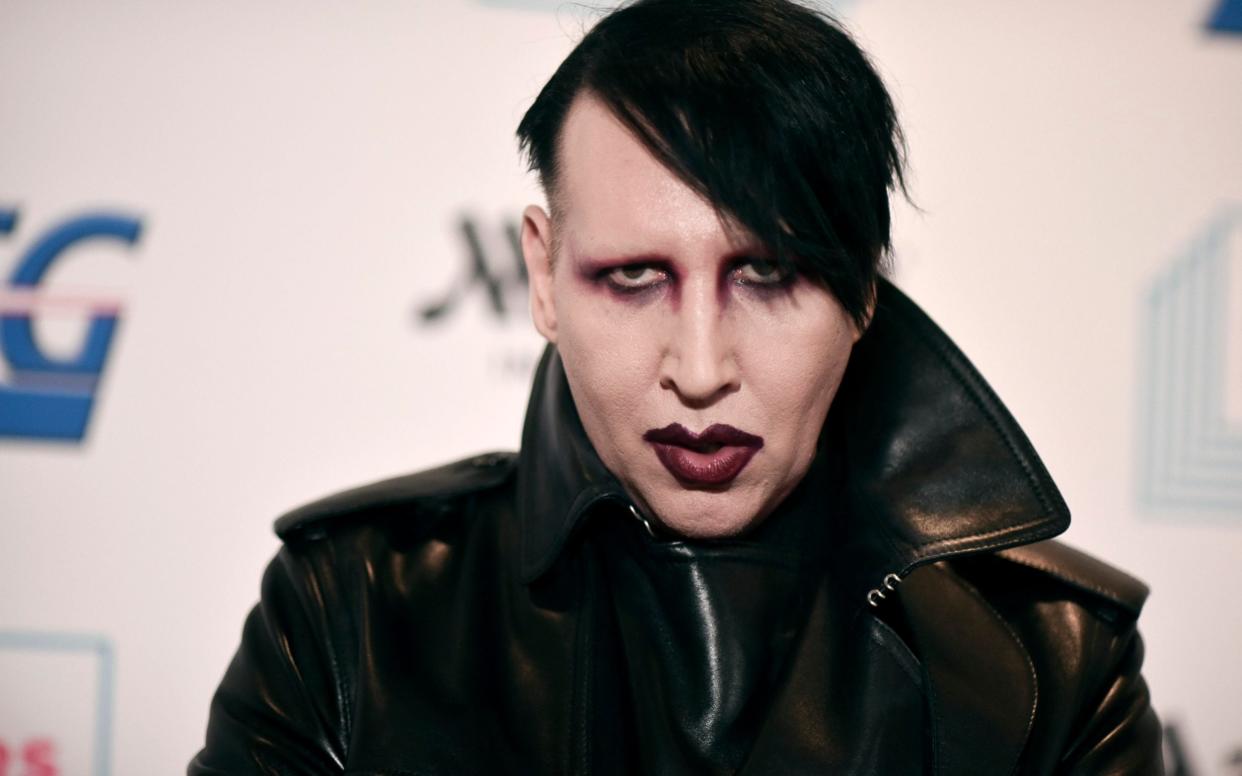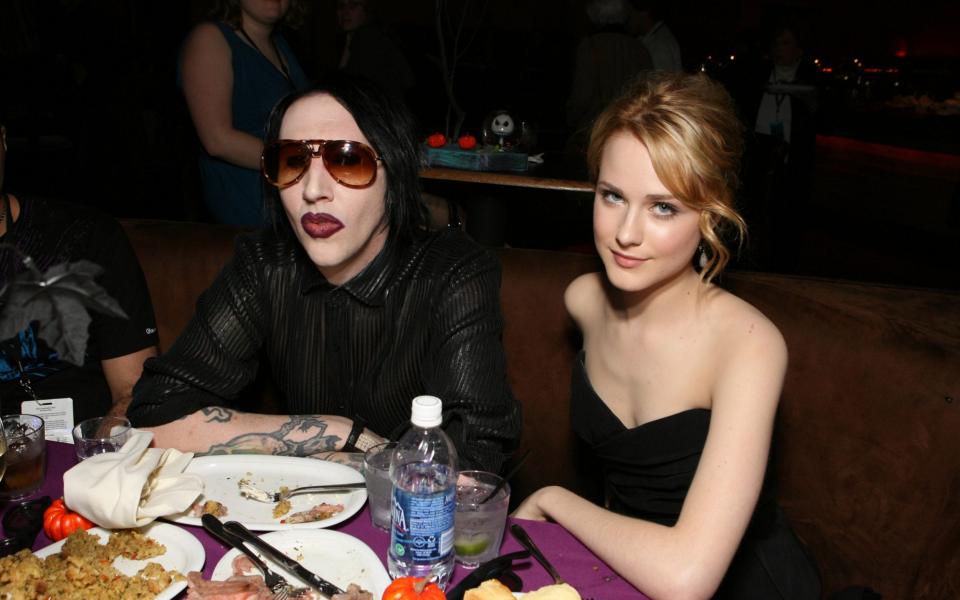Marilyn Manson's behaviour was no secret – he should never have been allowed to get away with it

- Oops!Something went wrong.Please try again later.
Yesterday, Evan Rachel Wood, identified Marilyn Manson as the person she claims abused her. Previously the Westworld star, who had dated Manson in the late ‘00s when she was 18 and he was 38, had spoken of her treatment as a teenager at the hands of an older, famous man who she hadn’t named. In 2018, she had given testimony to Congress in support of the Sexual Assault Survivors’ Bill of Rights Act, in which she spoke of abuse but did not name anyone. In a post on Instagram, she finally put the identity out there.
“The name of my abuser is Brian Warner, also known to the world as Marilyn Manson,” she wrote. “He started grooming me when I was a teenager and horrifically abused me for years. I was brainwashed and manipulated into submission. I am done living in fear of retaliation, slander, or blackmail. I am here to expose this dangerous man and call out the many industries that have enabled him, before he ruins any more lives. I stand with the many victims who will no longer be silent.”
Wood’s allegations were immediately followed by stories from, initially, four other women with whom Manson has been involved, all following a similar pattern of allegedly abusive, manipulative behaviour over a long period. All of these women – Manson photographer Ashley Walters, model Sarah McNeilly, model and actress Ashley Lindsay Morgan and artist Gabriella – claim that their experiences with him have left them with PTSD, and that they had been reticent to come forward before for fear of reprisal. “I have been afraid to bring any spotlight upon myself as to avoid winding up in his crosshairs again,” wrote McNeilly.
Manson has since released his own response on Instagram. “Obviously, my art and my life have long been magnets for controversy, but these recent claims about me are horrible distortions of reality. My intimate relationships have always been entirely consensual with like-minded partners. Regardless of how – and why – others are now choosing to misrepresent the past, that is the truth.” As distressing as these accusations are, it is not surprising that it is Manson’s name attached to them.
In 2009, having broken up with Wood, he told Spin, “I have fantasies every day about smashing her skull in with a sledgehammer.” He also told of how, on Christmas Day 2008 when the pair were separated, he was alone and spent the entire day phoning her. “And every time I called her that day — I called 158 times — I took a razorblade and I cut myself on my face or on my hands,” he said. “I wanted to show her the pain she put me through.”
This was later put down to artistic bravado, a dark public persona drumming up interest for his new album by saying things to shock. But people were already reading into the meaning behind 2007 video for Heart Shaped Glasses (When The Heart Guides The Hand), made shortly after they met. Knowingly stylised in part around the poster for Stanley Kubrick’s Lolita, it featured a lengthy sex scene that was suggested to have actually been real, as well as shots of the pair covered in blood. It wasn’t real, just an edgy video. That the pair engaged the year after the Spin interview, even if they broke it off not long after, seemed to say this was a (not exactly pleasant) bygone. However, in the inner ring, it seems that this was happening almost in plain sight.
A former member of Manson’s crew, Dan Cleary, wrote on Twitter last September that, over the course of a year he saw how the singer “Turned her into a different person.” Although he didn’t connect the dots at the time, he continues that, “I then starting working for him as his personal assistant in 2014-2015. I saw first hand, over and over him being an abusive violent boyfriend to his girlfriend Lindsay. Over the almost two year stretch I saw her in tears and him screaming and belittling her more often than I didn’t.
“He would threaten to kill her, cut her up, bury her, embarrass her to the world,” he continued. “Making her cry and fear him made him feel good. He would remind her that she’d be homeless without him and make fun of her learning disabled family member… Everyone in his immediate circle knows this. But everyone (including myself) is afraid to say anything because of ‘the code’. It's frowned upon to tell people’s private business.”
Had these been isolated allegations, perhaps the discussion around these accusations might be slightly different. But there is a history of this sort of behaviour on Manson’s part. In 2001, a security guard took him to court after his face was forcibly shoved into the singer’s crotch at a gig in Minneapolis – he won damages. Nevertheless, Manson’s sexual assault seemed to be of little consequence; instead passed off as extreme, dirty banter that was part and parcel of his artistic persona – people assumed he was just trying to shock.
But even before Manson was famous, stories about his toxic behaviour circulated, sometimes by Manson’s own initiative. In his 1998 autobiography, The Long Hard Road Out Of Hell, he tells a story of planning to kill an ex-girlfriend in an arson plot, foiled when he and his accomplice were interrupted by a homeless man. Elsewhere, meanwhile, he details a backstage bondage game in which fans were tied up and given filmed interrogations, and another incident in which a deaf fan was covered in meat and then urinated on in a shower. These last two stories are presented as being consensual. And, as distasteful as it may be, there’s a good chance they were.
But some of the response online to Wood’s accusation turn this idea of being the man for freaky sex into a tiresome and dangerous shift of blame onto the victims when it turns into actual abuse: it’s Marilyn Manson, they say, you know what you’re going to get. This line works in the sense that you don’t go for a man like that if you’re after a quiet life and an early night, but it’s not a get out of jail free card for anything that might happen during your relationship.
Having written about sexual assault, domestic abuse and the issues faced by women speaking out against their abuser, Serena Cherry of Bristol band Svalbard sees this, like the code of silence around big stars, as one of the biggest hurdles in these things coming to light and people being held to account. “I saw the ‘laugh react’ emoji pop up in response to every single post,” she says. “It is so disheartening to see such a lack of empathy towards Evan. The amount of predatory comments, saying she should have ‘known what to expect’ dating Manson sickened me – I saw people comparing it to women walking down alleys at 3am, claiming that women in these situations ‘get what they deserve.’”

So, why, even when there’s been red flags for years, does the industry, even those not directly in the employ, continue to support artists like this? Full disclosure, I have written favourably about Manson’s music in the past, just have so many others. It’s just The Way Things Were. Truthfully, these things were rarely at the front of people’s minds.
One thing, as Metal Hammer journalist Dave Everley discovered when he tried to bring up Woods’ account of an older man abusing her last year, is also that it’s quite difficult to ask the question. When asked, Manson said he doesn’t “respond to rumours” and that he wanted to talk about music. When pushed, he replied, “Like I said, I won’t qualify it with an answer.” Then he hung up. Perhaps as well, we’ve got so used to defending Manson against untrue and often ridiculous charges that when an allegation like Woods’ comes out, it almost gets lost in the noise.
In The Long Hard Road Out Of Hell, there are reprints of legal affidavits from witnesses, claiming that at gigs he would come onstage with a sack of puppies, kittens or chickens, and refuse to play until the crowd had killed them all. More famously, after the school shootings at Columbine, Colorado in 1999, the finger of blame was pointed at him, claiming that the two shooters were huge fans inspired by his work. In truth, neither liked him. In his response – cancelling his tour, including a Colorado date, deeming his own presence inappropriate, while the National Rifle Association went ahead with a convention in the state, and in his later response about the nature of culture in America – he showed that behind the Man That You Fear persona and sleazy reputation, he had both a brain and, surprisingly, a working moral compass.
But now, the accusations against Manson aren’t abstract or laughable. They’re stories many women, famous or not, will recognise. And it’s not a lone story. It’s not even the first one like this to come out this week. A new BBC Three documentary tells the story of Hana, the former girlfriend of rapper Octavian, who shared a video of him purporting to inflict a sustained physical assault on her. She also claims that she was offered £20,000 in exchange for her silence.
Octavian has denied these accusations, saying, "I wholly deny Hana's allegations, which are only one – grossly distorted – side of a troubled relationship. Much of what she has said, and has been reported, has been manipulated or is simply untrue. I will not go on trial by media, but I will repeat that I have not been violent or coercive towards Hana, and I am not a misogynist." So serious are these claims that the police are investigating, and his label has dropped him.
So, too, has Marilyn Manson’s label – Loma Vista severed ties with him yesterday, and his agent CAA has now followed suit. He’s also had his parts now cut from American TV shows American Gods and Creepshow.
For Serena Cherry, this response is a start as to what the industry can do to stop supporting such figures. But, she says, there is still a way to go before this kind of abuse against women in the industry is properly weeded out and it feels truly safe.
“Sadly, it seems to be the case that when major artists get named as abusers, they witness a spike in their record sales and streams,” she says. “Personally, I would like to see a much harder response toward abusers – like major streaming sites removing the work of abusive artists, record labels dropping abusive artists. Fans can still buy second hand records and listen at home if they choose, but the abuser’s work should no longer be promoted and supported by major platforms. There needs to be more serious repercussions for abuse in the music industry, or the problem will never go away.”

